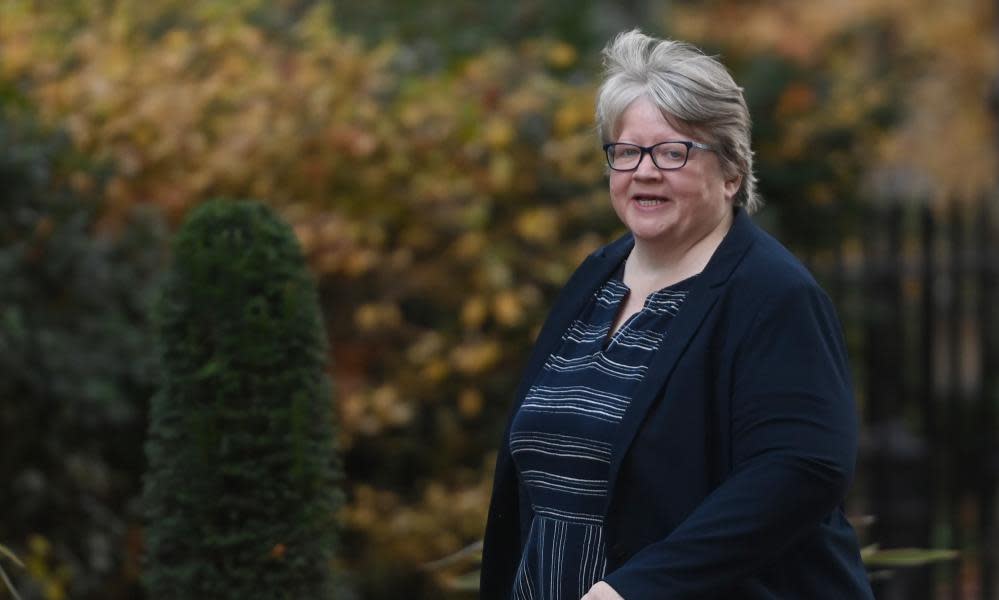Thérèse Coffey rules out help for farmers and consumers facing higher costs

The government has ruled out making any intervention in the market to help farmers or consumers with high food prices, the environment secretary, Thérèse Coffey, has said.
Food prices have soared in the past year, in part owing to higher input prices such as energy, fertiliser and animal feed. Last month, food price inflation hit a fresh high of 12.4%, with poorer households hit hardest.
Farmers have also complained that supermarkets are driving down the prices they pay to producers at the farmgate, leaving them making tiny profits. A report published last week by the food charity Sustain found farmers made less than a tenth of a penny in profit from a supermarket loaf selling to consumers for £1.14, and just a penny in profit from a £2.50 block of mild cheddar cheese.
But Coffey, secretary of state for environment food and rural affairs since Rishi Sunak took office in September, refused to criticise supermarkets and said the government would not be taking action.
“I am not going to be particularly critical of supermarkets – overall, having a competitive supermarket environment has done a lot to help consumers,” she told the environment food and rural affairs committee of MPs on Tuesday afternoon. “I don’t think we are at the stage of a market intervention directly when it comes to pricing.”
She acknowledged the growing demand for food banks around the country, and pointed to steps such as the forthcoming increase in benefits and measures to reduce energy bills, but declined to promise any further support. She said: “It is not the role of government to provide free food.”
In her first grilling by MPs on the environment, food and rural affairs committee since taking up the post, she also said she was “very disappointed by the water companies” and acknowledged concern over sewage flows into waterways. She said water company bosses were being summoned to account for their actions next week, and that they would be subject to more monitoring and would have to submit “real-time data”.
She stopped short of promising to crack down on sewage flows into rivers and beaches.
Coffey did, however, give comfort to those hoping for an expansion of renewable energy across the UK countryside. She moved away from the position adopted by Sunak in his leadership campaign, when he rejected solar farms on UK agricultural land, and said a government review of land use to be published in the first half of next year would take a “balanced” view.
She told the committee that land graded 3b for agricultural use – judged to be moderate quality, capable of producing cereals and grass – could be used for solar farms.
She said: “I’m not suggesting by default I want to put solar over every bit of 3b land. I think we do need to get that careful balance across that and make the best use of land. I’m more inclined about brownfield sites and certainly thinking through how farms and others can do a lot more self-energy production. I’m already conscious there are challenges about connecting to the grid.”
She added: “But undoubtedly, you know, we have 14 gigawatts of solar now. Right now, the ambition within the energy security strategy is to raise it up to 70 gigawatts.”
The farming minister, Mark Spencer, confirmed the government was not going to ban solar farms from 3b land.
He told the Guardian: “I believe Beis [the Department for Business, Energy and Industrial Strategy] and Defra are looking together at this, how we best use land and a land use framework is coming. But I am not in favour of a broad brush approach.
“We shouldn’t be stopping farmers who want to diversify their income from doing that as that would be harmful so I’d have no problem with them putting some solar panels down on 3b land. But we can’t then have thousands and thousands of acres taken away that could otherwise be used for food production. It has to be a balance.”
Dustin Benton, policy analyst at environmental think tank Green Alliance, welcomed the apparent shift in the government’s stance. “It’s refreshing to see ministers hint at a practical approach to making solar and farming work together,” he told the Guardian.
“We know that putting solar panels on cropland or grazing land while continuing to grow food reduces yields by just eight per cent, and can even increase yields in hot and dry summers. The government needs to focus on helping farmers to make the most of their land, including where their land is best used for clean energy or for nature.”
The solar industry also welcomed the move. “It will be a great relief to the solar industry to hear that Thérèse Coffey supports existing planning rules, which have successfully encouraged development away from the best quality agricultural land while recognising the critical need to expand solar farms in response to the climate and energy price crisis,” said Chris Hewett, chief executive of the trade association Solar Energy UK. “This looks like a significant shift from the anti-solar rhetoric of her predecessor,” he said.

 Yahoo Movies
Yahoo Movies 
